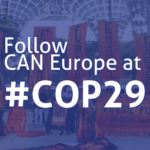Ahead of the General Affairs Council meeting on 16 October, business associations, think tanks and civil society urge EU ministers to align the next future EU budget with the Paris Agreement and the UN development goals.
The open letter, signed by 101 organisations and sent today to EU ministers of European and Foreign Affairs demands a dramatic improvement of climate action spending in the future EU budget. More money should be invested in the clean energy and transport transition, ecosystem protection and sustainable farming, and solid safeguards are needed to ensure climate compatibility of all funding programmes.
The recently published IPCC Special Report on Global Warming of 1.5°C shows the urgency of tackling run-away climate change, and that we still have the capacity to avoid the worst impacts of climate change and its huge economic costs. With its multiple funding programmes for energy, transport, agriculture, buildings, waste and international cooperation, the EU budget has great potential to better support the just transition to clean and sustainable economies throughout Europe and the world.
Wendel Trio, Director of Climate Action Network (CAN) Europe, said: “The sooner and the more we invest in the clean energy transition, the better for citizens and our economies. 40% of the future EU budget needs to benefit zero-carbon projects and not one cent should go to fossil fuels, gas included. This is the only way European public finance can help the world keep temperature rise to 1.5°C by the middle of this century.”
ENDS
Contact:
Nicolas Derobert, CAN Europe Communications Coordinator, nicolas@caneurope.org, +32 483 62 18 88
Quotes from other signatories:
Sascha Müller-Kraenner, Executive Director at Deutsche Umwelthilfe/Environmental Action Germany:
“It is time for the members of the European Union to show that there is indeed the political will to implement the Paris Climate Agreement. The European Union now has the opportunity to act with foresight, setting the financial course for a sustainable future rather than mourning the fossil past by increasing both the quantity and quality of climate spending.”
Peter Robl, Chairman of the Board at the Buildings for the Future:
“The Eastern European countries rely heavily on the Cohesion funding to renovate their building stock. More than two thirds of all their buildings are still in their original state – energy inefficient, polluting, not ready for climate change and at the same time expensive to run. Building renovation is key to both mitigation of the climate change and to adapting our societies the new climatic reality. Effective incentive programs are needed to drive renovation and motivate to high quality. The “EU Funds” can enable these incentive programs if allocated wisely and ambitiously to help Europe cope with its challenges.”
Jonathan Gaventa, Director at E3G, Third Generation Environmentalism:
“The EU budget is amongst Europe’s most powerful tools. It needs to be designed to address to Europe’s biggest challenges, including the shift to a zero-carbon economy. This means ending subsidies for fossil fuels, and targeting the areas that really matter: unleashing the next wave of zero carbon innovation, supporting communities and workers in the transition and building in resilience against climate change impacts.”
Climate Action Network (CAN) Europe is Europe’s leading NGO coalition fighting dangerous climate change. With over 150 member organisations from 35 European countries, representing over 1.700 NGOs and more than 40 million citizens, CAN Europe promotes sustainable climate, energy and development policies throughout Europe.



